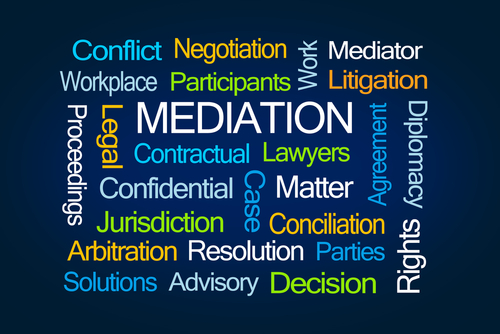By Leslie King O’Neal
Preparation is the Foundation for Mediation Success

Most construction cases now go to mediation, either via court order or voluntarily. How can attorneys and clients get the most from the mediation process, maximizing settlement opportunities? While attorneys don’t control all the factors leading to mediation success, pre-mediation preparation is the foundation for making the most of the mediation process. This post provides five questions to ask before mediation. They provide a framework to assist counsel in creating the foundation for mediation.
While selecting a mediator is a major factor in mediation success, even the most skilled mediator may find it difficult to get to “yes” in negotiations if all the decision-makers are not at the table or if they don’t have sufficient information to assess risk and evaluate settlement options. Pre-mediation preparation provides mediators with tools to use in caucus discussions.
Building the Mediation Foundation: Five Key Questions
Is your client prepared for mediation? Counsel should meet with the client’s stakeholders and decision-makers (and insurance adjusters, where applicable) before mediation and give them an honest assessment of the strengths and weaknesses of the case. Insurance adjusters need this information before determining settlement authority. Discuss the potential monetary costs (attorney’s fees, expert fees, discovery and e-Discovery costs, insurance deductibles, exhibit preparation) and non-monetary costs (lost opportunity costs, reputational damage, possible damage to relationships) for continuing litigation or arbitration. Discuss the client’s expectations and goals for settlement as well as possible deal-breakers. Assess whether there are emotional obstacles to settlement.
Have all the necessary parties been notified of claims? In addition to the parties to the dispute, have insurers, sureties, guarantors or other possible settlement contributors been notified of claims or included in litigation? Has there been sufficient information exchange among the participants to support settlement decisions? Are the real decision-makers available to attend mediation? If these have not been done, how long will it take to accomplish these things? If critical information is needed, request it from opposing counsel in advance. Utilizing the mediator to facilitate information exchange can streamline the process and provide confidentiality.[i] Information exchange before the mediation session can improve the chances of settlement at mediation and can avoid doing this over a prolonged period after the session.
Are the critical legal and factual issues in the case developed? It’s just as important to know these before mediation as it is before trial. Are site investigations or testing needed? Would expert reports (summary versions may be enough) be helpful? While full blown discovery may be cost-prohibitive, having test results or expert opinions can be useful in many cases. As noted above, the mediator can assist in the information exchange prior to a mediation session. Showing up the day of the mediation with an expert report that the opposing party hasn’t seen can be fatal to settlement—at least on that day.
Are damages summaries available for exchange? One of the most common obstacles in mediation negotiations is the lack of adequate damages information and documentation. Insurance adjusters need this information to obtain settlement authority before the mediation session. All parties seeking payment need to review their damages information and prepare a damages summary. This should be shared with the mediator and opposing parties several weeks before the mediation session.
Have you scheduled a pre-mediation conference call with the mediator? Each party should talk with the mediator at least a week before the mediation session. If your client doesn’t have mediation experience, consider including the client or client representatives in the call. This is a time to discuss all aspects of the case with the mediator, including the parties and personalities, prior settlement discussions and obstacles to settlement . Tell the mediator about emotional obstacles or hostility between the parties that may influence the negotiations. Having this call is recommended even if you provide a mediation statement. There is no substitute for this kind of candid discussion to help the mediator develop a strategy for reaching settlement.
Tailor mediation preparation to the case. These are preliminary questions for attorneys to ask when considering mediation. Every case is different, so the mediation preparation must be tailored to the specific client and the case. There are many resources for construction lawyers to access when preparing for mediation, some of which are listed below.
[i] For example, in Guided Choice Mediation , the mediator assists the parties in targeted document exchange under the mediation settlement umbrella; meets with the parties before the mediation session to identify factors that led to stalemate and recommends a customized settlement process to overcome existing and future impasses. See “Guided Choice Mediation–Early Dispute Resolution Using the Best Practices of Commercial Mediation and Arbitration.” http://gcdisputeresolution.comand also found in this website’s Recommendations and Resources page https://theconstructionadrtoolbox.com/recommendations/ Watch for future posts on how to use “Guided Choice Mediation.”
This post was adapted from Florida Mediation Best Practices Handbook (3d Ed.) (Harold Oehler, Editor in Chief), Section II. Mediation Best Practices for the Trial Lawyer http://flabaradr.org, also found in the Recommendations and Resources page https://theconstructionadrtoolbox.com/recommendations/
Additional Resources for Mediation Preparation
Preparing for Mediation: A 10 Step Guide (ADR Times June 11, 2024) https://adrtimes.com/preparing-for-mediation/
The Advocate’s Mediation Checklist, “What Works, What Doesn’t” (Sam Imparati, The Institute for Conflict Management 2005) https://www2.mediate.com/ICM/docs/Advocates%20Checklist%20for%20Mediation.pdf
